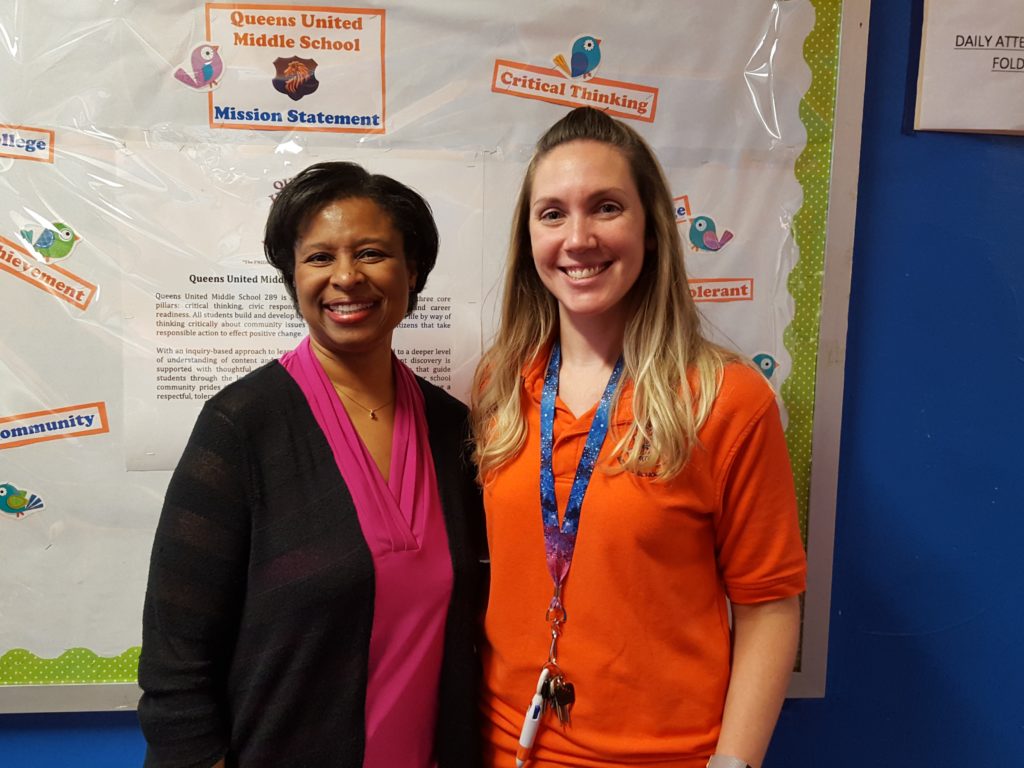November Person of the Month: Michelle Rand

Sharon Chapman, Turnaround instructional coach, with Michelle Rand, seventh-grade math teacher at Queens United Middle School
Michelle Rand is a seventh-grade math teacher at Queens United Middle School, now in its second year of partnership with Turnaround for Children. Ms. Rand was nominated by Turnaround Instructional Coach Sharon Chapman for her leadership in creating a teacher boot camp to train all new and returning teachers on schoolwide procedures before the first day of school.
THE 180: How long have you been teaching?
MICHELLE RAND: Thirteen years; this is the start of my fourth year at Queens United.
THE 180: Did you always know that you wanted to work in education?
MICHELLE RAND: I wasn’t 100% sure. In college, I majored in biology and mathematics, but it was really the math that interested me. I knew I didn’t want to have a career sitting behind a desk all day; it’s not my personality. So, I took a few education courses and fell in love. I’m happy that change happened. I don’t think I would have been as happy doing something else as I am teaching, as stressful as it can be.
THE 180: This is Turnaround’s second year partnering with Queens United. What changes have you noticed in the school?
MICHELLE RAND: The school’s environment is much calmer this year than it was last year. A huge part of this is because of better hallway transitions. We had a transition team that worked together to format how each grade would transition, who would be involved and how to roll it out to staff. That’s been huge, getting kids to class on time. We also have teachers at the door greeting each kid individually as they come into the classroom so we can see whether or not the kids are ready. If they’re not emotionally ready to come in the class, we give them a few more minutes—go to the back of the line and get yourself together before coming in.
We also spent a lot of time at the beginning of the year with the teachers talking about classroom routines and how important they are for our kids by creating a structured environment where they feel safe. That was something that wasn’t necessarily present in all the classrooms last year, which made things challenging because students didn’t always know what they should be doing. This year almost every single classroom has very specific and noticeable classroom routines and procedures.
THE 180: Yes, Sharon told us that you created a teacher boot camp at the beginning of the year for new and returning students. What prompted you to do that?
MICHELLE RAND: We noticed that that kids did better in classrooms where there were consistent routines and procedures. A lot of teachers didn’t have these routines so we thought the problem might be that they just didn’t know how.
It was really important to train, especially the new teachers, on how to create routines and procedures before class even starts. Even something as simple as how kids enter the classroom has a big effect – what should kids be doing? Is there a do-now activity on the board when they first arrive? The Teacher Boot Camp was a way to create consistency across the school. If students know that in every classroom they have some type of do-now activity for them, they know what to expect. They know what happens step-by-step, so there are less behavioral interruptions and teachers are able to focus more on content vs. behavior.
THE 180: What Turnaround for Children strategies do you find yourself using the most?
MICHELLE RAND: I would say I use the three R’s the most – reminding, reinforcing and redirecting language. I think I always try to use positive language, but I’m more mindful of it now. I take time to stop, take a breath and think about what’s going to come out of my mouth and who I’m going to address. My first year at Queens United, I would get very frustrated and yell a lot. My second year, before Turnaround came, I knew yelling wasn’t going to cut it. Then when Turnaround came, I realized, okay, this is what’s going to work.
THE 180: What is the most important thing that students need to succeed?
MICHELLE RAND: I think that they need their basic needs met. Before they can succeed, they need food, shelter, a safe home and an adult they can trust. They need things before even coming into the school building, which a lot of kids lack.

Share This Story